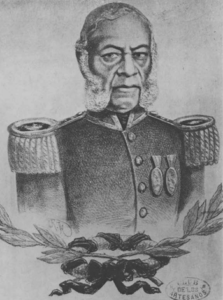
Domingo Sosa
*Domingo Sosa's birth is celebrated on this date in 1784. He was an Afro Argentine soldier who became an army colonel and participated in the Wars of Independence and the Argentine Civil War.
Born a slave in Buenos Aries, Argentina, with no formal education, he learned to read and write. His parents were Agustín Sosa, a soldier, and Ana Abeleiro, a native of Buenos Aires. He enlisted into the city's Regimiento de Castas (a mixed-race regiment) in 1808. From 1811, he took part in the two sieges of Montevideo until their end, taking part in the attack in the Battle of Cerrito, with the toughest part of the conflict borne by the "blacks" in the regiment of Colonel Miguel Estanislao Soler.
He was promoted to the rank of lieutenant. In April 1813, he took part in a campaign under the orders of Domingo French to secure the frontier area of the river Yaguarón against incursion from Portuguese forces entering from Brazil. In early 1815, he was sent to the Army of the North to participate in the Battle of Sipe. He was sent back to Buenos Aires, where he was commissioned instructor of Black soldiers. In 1817, he applied for retirement at the rank of captain but was commissioned head of custody of the prison near present Dolores. He was promoted to the rank of captain.
In 1822, he was retired by the military reform of Bernardino Rivadavia, which damaged him greatly. He became a laborer and foreman. He returned to the service in 1828, and at the end of that year, he joined the forces of Dorrego. The following year he was in the army of Juan Manuel de Rosas, under whose orders he fought as an officer in command of an infantry battalion in the Battle of Puente de Márquez. In 1831, he was in the army in the campaign against the League of the Interior under the orders of Juan Ramón Balcarce. In 1833, he defended Governor Balcarce from the Revolution of the Restorers.
As a result, he retired later that year and decommissioned in 1835. During the following years, he served in several offices and several times as a police officer in the city. He rejoined the army in 1845 and was posted to command a battalion of black soldiers from the city and its outskirts. He was promoted to the rank of colonel, and as such, he participated in the Battle of Caseros, in which he was seriously injured. His life was saved only by chance because the victorious army's doctors (almost all from the Rosas Army were killed) cared for non-white injured soldiers only after white soldiers had been cared for.
After serving as the personal guard of Governor Vicente López y Planes, he supported the revolution of September 11, 1852, and was elected a province member in October. He served with distinction in the defense against the siege of Buenos Aires with Hilario Lagos's federal troops, and he was promoted to the rank of colonel on March 1, 1853. He was a conventional provincial constituent in 1854, the most important political office a black man has held in Argentina. He was also, along with Lorenzo Barcala and José María Morales, one of the few Black colonels in Argentina's history.
He also returned to being an elected province member in 1856. His first wife was Pascuala de la Roza Contreras, who died in 1851; he then married an older woman, Petrona Mauriño, who died in 1859. For the rest of his life, he commanded a regiment of Black militias but did not fight in the Battle of Pavón, which formed part of the defense of Buenos Aires. He died in Buenos Aires in May 1866.